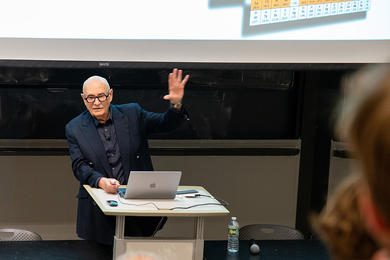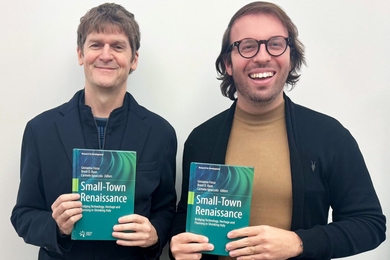Ballot stuffing. Assassination. Revolution. The talk around the dinner table during F. Daniel Hidalgo’s formative years was unlike that of most kids. Hidalgo’s father worked in politics in Mexico before he moved his family to America when Hidalgo was four.
Hidalgo’s father had left Mexico behind, but not his interest in Mexican politics. “Mexico was changing, going from a one-party authoritarian regime to a multi-party democracy,” says Hidalgo, now an assistant professor who joined the MIT political science department in 2012. “It was a very dramatic time.”
Talk of corrupt elections, voter fraud and political upheaval captivated Hidalgo. “Stories about Mexican politics were way more interesting to me than U.S. politics,” he says.
Later, when Hidalgo attended Princeton University as an undergraduate, he studied political science. In graduate school at the University of California at Berkeley, he did research into political elections in less-developed countries, mostly in Latin America.
In the United States, elections tend to be fair and accessible. Voters rights groups help get out the vote with support for the disabled and elderly and special systems that allow people to vote even if they cannot be present on voting day. In U.S. presidential elections, Hidalgo says, the tally of invalid votes rarely tops 2 percent.
But in poor countries or in places overrun by political corruption, casting a vote that counts isn’t so easy.
During graduate school, Hidalgo looked at election fraud and inaccuracy in Brazil, specifically focusing on the influence of electronic voting on elections. Brazil was the first country to adopt nationwide electronic voting.
Hidalgo found that, before the adoption of electronic voting, when people voted with paper ballots, between 30 and 40 percent of votes in legislative elections were counted as invalid. Not only did he find a lot of fraud, but he found that the paper ballots used were inherently unreliable. Voters actually had to write the name or candidate number of their selected candidate on the ballot.
Read full article
Hidalgo’s father had left Mexico behind, but not his interest in Mexican politics. “Mexico was changing, going from a one-party authoritarian regime to a multi-party democracy,” says Hidalgo, now an assistant professor who joined the MIT political science department in 2012. “It was a very dramatic time.”
Talk of corrupt elections, voter fraud and political upheaval captivated Hidalgo. “Stories about Mexican politics were way more interesting to me than U.S. politics,” he says.
Later, when Hidalgo attended Princeton University as an undergraduate, he studied political science. In graduate school at the University of California at Berkeley, he did research into political elections in less-developed countries, mostly in Latin America.
In the United States, elections tend to be fair and accessible. Voters rights groups help get out the vote with support for the disabled and elderly and special systems that allow people to vote even if they cannot be present on voting day. In U.S. presidential elections, Hidalgo says, the tally of invalid votes rarely tops 2 percent.
But in poor countries or in places overrun by political corruption, casting a vote that counts isn’t so easy.
During graduate school, Hidalgo looked at election fraud and inaccuracy in Brazil, specifically focusing on the influence of electronic voting on elections. Brazil was the first country to adopt nationwide electronic voting.
Hidalgo found that, before the adoption of electronic voting, when people voted with paper ballots, between 30 and 40 percent of votes in legislative elections were counted as invalid. Not only did he find a lot of fraud, but he found that the paper ballots used were inherently unreliable. Voters actually had to write the name or candidate number of their selected candidate on the ballot.
Read full article






